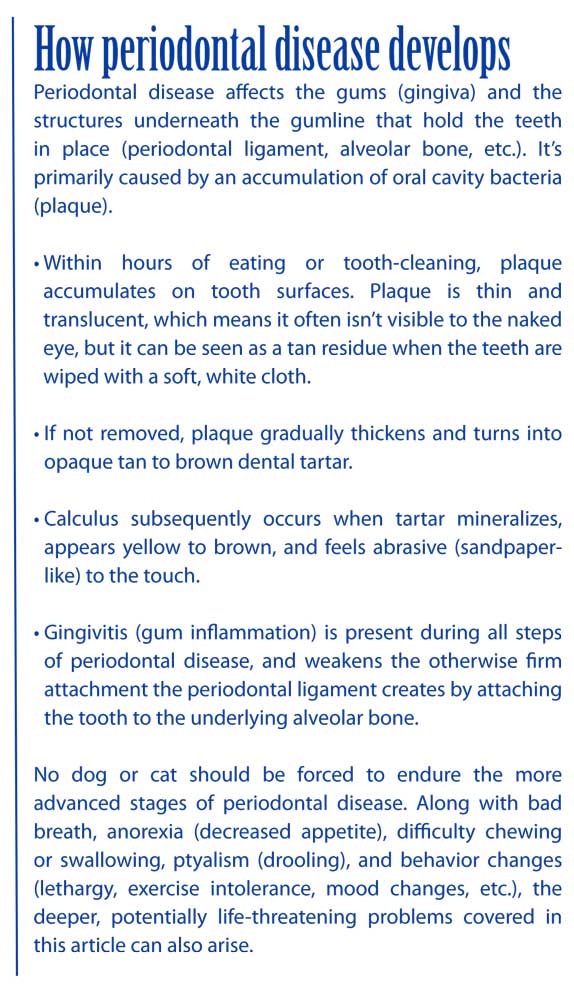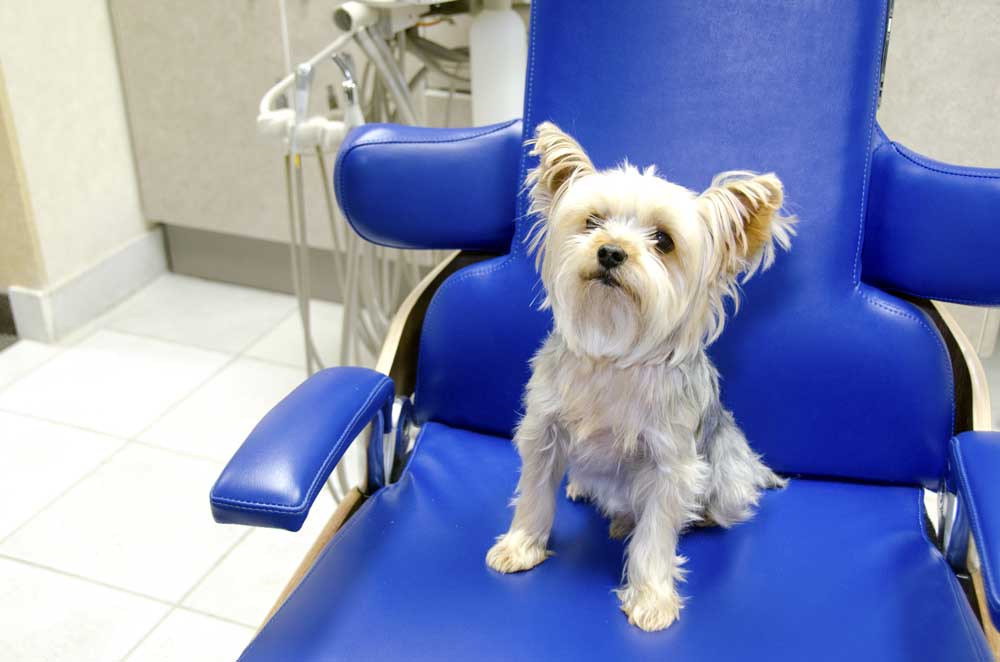Dental issues may harm your dog or cat’s kidneys, lungs, liver, heart and even his immune system.
Do you factor your dog or cat’s dental wellness into his overall health regime? If not, his internal organs are at risk of potentially life-threatening damage. Veterinarians have established February as Pet Dental Health Month, but you should strive to take care of your companion’s teeth and gums all year round in order to avoid the potential for kidney, lung, liver and heart problems.
Dental disease and the effects on organs and immunity
One of the most severe aspects of periodontal disease involves the toxic effects oral cavity bacteria have on the internal organs and immune system. Bacteria escapes from the mouth and enters the blood through inflamed gums or exposed blood vessels in fractured teeth, and circulates around the body. It also causes inflammation in the lymph nodes and vessels in the neck and other parts of the body.
“Dogs and cats with periodontal disease are more likely to have histopathologic changes in the heart, kidneys and liver,” says veterinary dentist Dr. Curt Coffman, when discussing the deleterious health implications associated with oral cavity bacteria. “Histopathologic changes” are cellular abnormalities seen during microscopic examination of body tissues. Dr. Coffman’s perspective that periodontal disease “can shorten a pet’s life by affecting vital organ systems” is good motivation for committing to a daily, lifelong home dental care regime for dogs and cats.
The heart and respiratory tract are two areas where dental disease can cause problems.
1. The heart
Heart murmurs occur when the heart valves open and close improperly, affecting the control of blood flow. They can appear or worsen as a result of inflammation and damage associated with mouth bacteria. I’ve actually had heart murmurs improve in patients after anesthetic dental procedures are done to eliminate the source of oral cavity bacteria, and an appropriate course of antibiotic therapy is administered.
The heart muscle can also be affected by periodontal disease, preventing the heart from filling and emptying properly.
Arrhythmia, abnormal electrical conduction through the heart’s muscular walls, can also occur and be potentially deadly if not readily resolved.
 2. The respiratory tract
2. The respiratory tract
The mouth connects to the respiratory tract through the trachea, which is also known as the windpipe. The movement of bacteria from the mouth into the trachea can cause a thickening of airway tissues and a reduction of the diameter through which air moves, ultimately decreasing an animal’s ability to breathe and oxygenate. Additionally, bacteria can seed the bronchi, bronchioles and alveoli, which are all portions of the lungs, and cause pneumonia and other airway diseases.
The mouth also is intimately associated with the nasal cavity, since the roots of upper teeth abut against the sinuses. Tooth abscesses (pockets of bacterial infection) can erode through to the respiratory passages in the muzzle and lead to nasal discharge with a variety of appearances (blood, mucus, “pus”, etc.) or swelling around the eye socket.
3. The kidneys and liver
Since the kidneys, liver, and other organs lie deep within the body’s cavities, the damage caused to them by mouth bacteria may not be readily apparent. Blood and urine testing may be needed to establish the degree of normal or abnormal function in these organs. Blood testing may reveal changes in kidney or liver values, while urine testing can reveal dilute urine (as the kidneys lose their ability to normally concentrate the urine), the presence of protein resulting from kidney cell damage, or other findings.
4. The immune system
Periodontal disease is also taxing on the immune system. Managing inflammation and bacteria in the mouth inhibits the complicated processes involved in the production and movement of white blood cells in the blood, lymph and other body tissues. Blood testing may reveal an elevation of globulins (immune system proteins) and changes in white blood cell counts. As a result, the immune system cannot effectively manage stress, prevent infection on exposure to pathogens (viruses, bacteria, fungi, etc.), fight cancer, eliminate dead and dying cells, and perform other essential functions that promote whole body health.
The best way to keep these serious problems from impacting your dog or cat’s health and longevity is to resolve any existing periodontal disease, and prevent recurrences. Consult with a holistic or integrative veterinarian about the best way to address your animal’s mouth and whole body wellness, and get started as early in your canine or feline’s life as possible. Remember, prevention is always the best medicine.
Veterinarian Dr. Patrick Mahaney graduated from the University of Pennsylvania School of Veterinary Medicine in 1999. He is a certified veterinary acupuncturist from the International Veterinary Acupuncture Society. His practice, California Pet Acupuncture and Wellness, offers integrative medicine. Dr. Mahaney writes a veterinary blog for patrickmahaney.com and is working on his first book, The Uncomfortable Vet.

